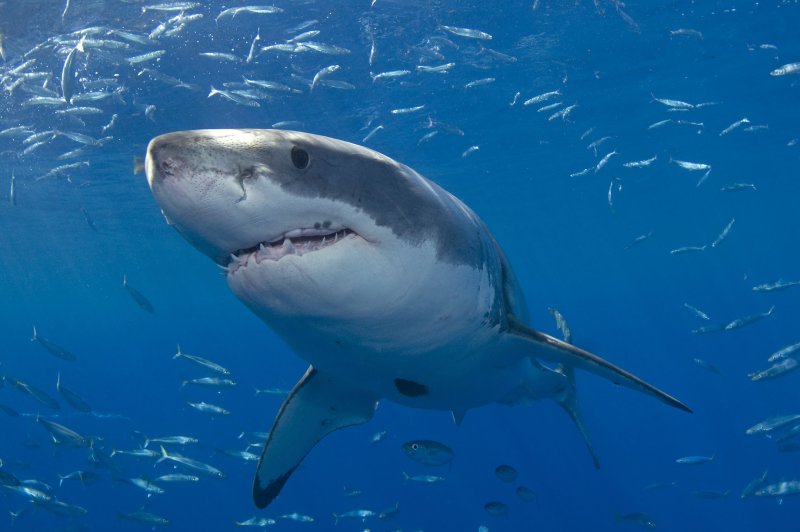A Great White is observed during behavioral research studies being conducted on Great White Sharks off of Isla Guadalupe, Mexico on September 15, 2008. Club Cantamar, primarily a tour operator has branched into conducting coordinated research with Isla Guadalupe Conservation to protect the species of sharks while offering tourists to Mexico the ability to also observe the sharks as they migrate through the area. The Conservation agency reports its findings to the Mexican Government which maintains authority on granting this activity. (UPI Photo/Joe Marino) |
License Photo
PERTH, Australia, Feb. 5 (UPI) -- Government officials in Western Australia continued their war on sharks Wednesday, even as protests of the "catch and kill" policies intensified.
Under orders from the state government, and with the blessing of Prime Minsiter Tony Abbott and his Environment Minister Greg Hunt, officials have set out drumlines to catch sharks who venture too close to shore.
The $20 million policy is in response to an apparent uptick in deadly shark attacks off Western Australia's popular and beautiful beaches -- seven fatalities in the last three years. In contrast, more than 100 million sharks are killed by humans every year. Still, policy officials decided something had to be done to quell the fears of would-be tourists.
The "catch and kill" program has quickly earned a rash of angry protests from environmental and conservation advocates. This past weekend, 6000 people amassed at Perth's Cottesloe Beach to voice their displeasure.
"Sharks simply aren’t interested in us as a food source. If they were, we’d lose people every day," Ross Weir, the leader of a group called Western Australians for Shark Conservation, told Guardian Australia.
“It won’t be an easy fight as we’re faced with an arrogant and stubborn premier who is determined to stick his head in the sand. But we won’t relent until a research and education approach is used instead of this cull.”
Patrollers have so far caught and killed two sharks, and other smaller ones have been caught and released. The first casualty came on January 26, Australia Day (the country's official birthday), when a fisherman caught a tiger shark and shot it four times in the head.
Critics say that shark attacks will remain a rare but inevitable occurrence with or without the wasteful policy.
Surf Life Saving Western Australia has taken another approach -- fitting more than 300 sharks with transmitters that tweet their location to beachgoers when they venture too close to shore.
"The worst part of what the government is doing is killing sharks that are innocent," 78-year old underwater cinematographer Valerie Taylor told The New York Times.
Conservationists are concerned that the policy, besides being wrong, could disrupt the local marine ecosystem. And there is broader concern that the Australian government is increasingly hostile to scientific and environmental sympathies -- maybe the worst in history, The Independent surmised.
"This crowd [the government] have been in office for less than six months," David Payne wrote in a letter to the Sydney Morning Herald this week. "Imagine the damage they can do in three years [the parliamentary term]."
The Guardian
[The New York Times]
[Sydney Morning Herald]







